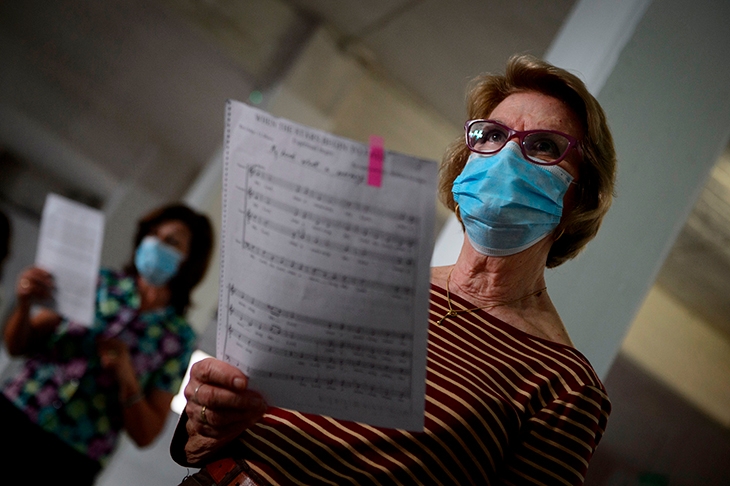Growing pains
Sir: James Forsyth (‘Rewiring the state’, 4 July) shocked this loyal Spectator reader with the following: ‘Even before Covid, this country was in a productivity crisis and it’s nigh-on impossible to improve productivity without government involvement. Increasing productivity requires improvements to be made to physical and digital infrastructure and to the skill base, and those need public investment.’
James clearly has not studied the sources of productivity growth (or lack of it). In the 50 years to 2008, the UK experienced around 2 per cent p.a. growth in real Gross Value Added per hour worked — which is what politicians generally mean when they talk about productivity. Since then, productivity growth has effectively stalled. The source of this growth was a combination of rising shares of GDP in high productivity sectors, together with falling shares in low productivity sectors. The source of the recent stalling appears to be the weakness in productivity of the previous drivers — particularly banking and financial services.
The picture is complicated, but the evidence is overwhelmingly that government expenditure is a brake on productivity growth. Increasing capital intensity and technological innovations are the two principal drivers of growth, but capital intensity refers to private capital, not government infrastructure capital. If the government is serious about growing productivity, then it should address its role in the impediments to growth, not waste money on token infrastructure spending.
Neil Record
Chairman, Institute of Economic Affairs
The magic of Evensong
Sir: Once, as a ten-year old-chorister, I asked the precentor what would happen if nobody came to Evensong. He looked at me as if it was a ridiculous question. ‘We should sing it anyway,’ he said. The offices of the day were, until months ago, some of the last remaining rituals of time and reflection which we shared with every day of our lengthy past. At ten, I knew nothing closer to magic, and I am still not sure I do. That is why Ysenda Maxtone Graham is exactly right to publicise the impact of recent months on choral music (Arts, 11 July). Child choristers give up their weekends, Easters, Christmases; it is in many ways a livelihood that they have lost. Indeed, though there is a great need to shore up churches and cathedrals as landmarks of our past, some of my sweetest memories of singing together took place elsewhere: Bruckner’s ‘Locus Iste’ spontaneously in a Welsh cave while on tour, and similarly ‘Hallelujah’ gathered round a piano at Heathrow. Whether you are Christian or not, whether or not a church building is the setting for you of that linkage, singing can enact it. We must sing again. After all, as I soon learnt, there never was and never will be an empty Evensong. Somebody always needs it. At present, we all do.
E. Clark
Devon
Check mates
Sir: I enjoyed William Cook’s article about online chess (‘Notes On’, 4 July). Like him, I have joined chess.com, but I find the many nationalities that I am meeting online to be fascinating. The chat function gives you the chance, mid-game, to speak with your opponent and, with just chess as the common bond, it is an amazing leveller. Chandra from India thinks I’m a ‘cool old dude’, and Sven in Sweden enjoys sending me sympathetic emojis as he corners my king. Lockdown? I’m travelling the world!
Rich M. Hughes
London SW13
Facing the music
Sir: I read with interest John Rutter’s remarks regarding the lot of many musicians amid the present ‘crisis’ (Diary, 11 July). As a working musician I too have had all shows cancelled for this year. Fortunately as a co-writer I have payments coming through; but for many musicians who only get paid when they work, this has been a disastrous period. I regard it as monstrous that so many livelihoods and businesses have been destroyed and I hope that when the British people get the chance they will make their displeasure plain.
Richard Fairbrass
Windsor
Shady scientists
Sir: In his book review (‘Bad science exposed’, 11 July) David Wootton seems sanguine about the integrity of published science findings. He draws comfort from modern checking tools. In some cases, though, the publicity given a purported discovery overwhelms any checking process or findings.
The ‘hockey stick’ temperature curve was given enormous publicity by the Intergovernmental Panel on Climate Change. It was seen and accepted by millions. However, only a comparatively miniscule number will have even heard of the book The Hockey Stick Illusion by A. W. Montford. Similarly, the media reports of the MMR vaccine causing autism resulted in a widespread fear of vaccines which was not totally removed by the scientific finding that the story was fake.
It is sad to realise that rather than science being the last bastion of rationality and integrity, scientists are no more trustworthy than lawyers and accountants.
Kenneth MacLean
Southampton
Have you herd?
Sir: Charles Moore makes reference to playing ‘Spot the ball’ in the sports pages of newspapers (Notes, 13 June). As a countryman he may like to subscribe to the Cumbrian version in the Westmorland Gazette, on the back page of which we have ‘Spot the dog’. The photograph is of a field of sheep being herded, with the sheepdog removed. The contest is to put one’s cross on the nose of the missing dog. This is edge-of-the-seat stuff in sheep country.
N. P. Barnes
Cumbria
Write to us: letters@spectator.co.uk






Comments